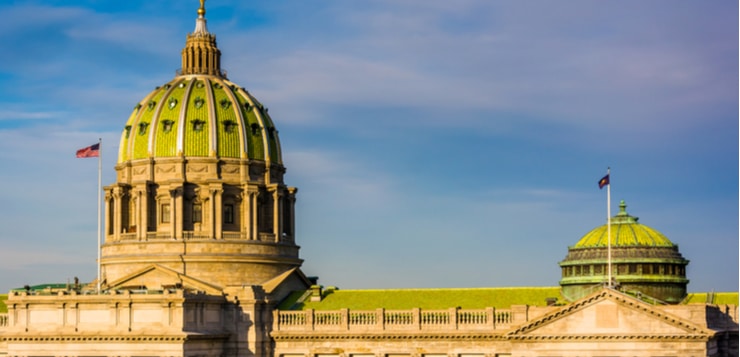Pennsylvania casino executives used the old “best defense is a good offense” strategy when describing the status and future of the state’s gaming industry to a panel of lawmakers Wednesday.
A Harrisburg meeting of the House Gaming Oversight Committee had been billed as a “public hearing on how the casinos have fared throughout the pandemic and their financial outlook for the future.”
While executives representing nine of the 14 casinos alluded to the financial hit they have taken since March from COVID-19 closures and restrictions, they were more pointed in bringing up on their own a different threat: the possibility of VGTs or so-called “skill games” being widely legalized by the legislature.
That was even though committee Chairwoman Susan Helm emphasized that the purpose of the hearing, which lasted more than two hours, was COVID’s impact. She said hearings about VGTs and skill games would be held later, but the casinos wanted their opposition to any expansion on the record now.
Parx Casino CEO Eric Hausler spoke of all the harm already being done to the industry and the state by thousands of unregulated machines in bars, stores, clubs, and other venues, with no oversight of such concerns as problem gambling and money laundering.
And legalizing them and taxing their revenue would only make things worse, he and others stressed, for the current casino industry trying to get back on its feet.
“We don’t believe a massive expansion of available gaming in the state will either give the state the benefit it needs or return our industry to normalcy,” Hausler said. “There’s 20 different things with that entire model [of neighborhood machine use] that we take exception to.”
Issue has come up before, with no action
The issue of taverns and clubs wanting the ability to host gambling machines to boost their revenue has circulated for many years in Harrisburg. There’s nothing to indicate passage is any more likely in the still-young 2021-22 session, although there will likely be attempts to try.
Senate Republican leaders mulled an expansion bill sanctioning machines for liquor license holders last June, but it never came to a public vote. Numerous hearings on the topic have been held previously.
No one disputes that machines are already widely in use around the state without legal authorization, but enforcement has been rare. Many businesses and organizations say they need the funds to prop up otherwise-lagging revenue, and the skill games in particular are in a gray area of law, with a pending Commonwealth Court ruling on their status.
From the casino industry’s standpoint, however, any consideration of giving the unsanctioned machines the same legal, regulated, taxed status as their own slot machines would be violation of a “business partnership” between the casinos and state.
If not for the COVID hit, the executives and their attorneys noted, the casinos would have provided some $1.5 billion in tax revenue to Pennsylvania — more than any other state — with the bulk of it from their slot machines. Instead, that tax figure was $1.1 billion last year.
Attorney Mark Stewart, who represents multiple casinos, said that while people most commonly think about Nevada when discussing the gaming industry, “they really should be thinking about Pennsylvania, which consistently beats Nevada in tax money it collects from casinos. At full capacity, the industry brings tremendous results like clockwork.”
Casinos concerned about fairness, fragility
Casino representatives repeatedly brought up two points:
- On the assumption there would be no other new gambling competition to face afterward, they have made sizable investments since the legislature and governor approved a 2017 expansion that allowed them mini-casinos, sports betting, and iGaming opportunities.
- The industry is in an unusually fragile period, at present, due to COVID’s impact and should not have to confront new open competition.
While overall gaming revenue in the state was down 22.2% in 2020 from 2019, that was softened by internet-related income, and land-based slots revenue was down 42.6% in a year in which casinos only operated two-thirds of the year.
Even when operating, the restrictions mandated on their capacity, alcohol sales, and smoking – as well as any health concerns keeping patrons away – resulted in negative impact such as a 26% reduction in slots revenue last month compared to January 2020.
“Give us an opportunity to fully recover from the pandemic before you enact any new expansion,” implored Kathy McCracken, executive vice president and general manager of Wind Creek Bethlehem, although the industry is also opposed to legalizing such expansion at any future time.
Executives said to do so would be an unfair reversal, considering the legislators discussed such legalizing for bars and clubs as the broad 2017 legislation was being developed, and they ultimately declined to make that inclusion.
“It would send a bad message to the business community for legislators to consider changing the rules on operators at this point,” said Joe Billhimer, executive vice president of Cordish Gaming Group, which he noted has made an $850 million investment in opening its two Live! casinos in Philadelphia and Westmoreland County in the time since the last expansion was approved.
The casinos also got backing for their contributions to jobs, economic development, and community investment from others testifying, including county commissioners and Pennsylvania Gaming Control Board Executive Director Kevin O’Toole, although they did not address the expansion issue.
Of the casinos’ response to the pandemic, O’Toole said, “The casinos have stepped up and taken this challenge head-on and done everything asked of them under very difficult circumstances.”






